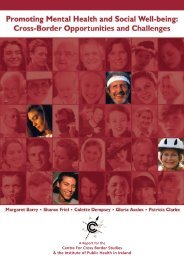improving government service delivery to minority ethnic ... - NCCRI
improving government service delivery to minority ethnic ... - NCCRI
improving government service delivery to minority ethnic ... - NCCRI
Create successful ePaper yourself
Turn your PDF publications into a flip-book with our unique Google optimized e-Paper software.
<strong>improving</strong><br />
<strong>government</strong><br />
<strong>service</strong><br />
<strong>delivery</strong><br />
<strong>to</strong> <strong>minority</strong><br />
<strong>ethnic</strong> groups<br />
Chapter 4: Ireland Research Findings 108_109<br />
204_Spain, Portugal,<br />
Finland and Greece have<br />
also lifted restrictions, as<br />
of 1 May 2006, while the<br />
Netherlands is reported <strong>to</strong><br />
be considering a move by<br />
the end of 2006.<br />
Figure 7: Work Permit Numbers<br />
50,000<br />
40,000<br />
47,551<br />
40,322<br />
34,436<br />
34,067<br />
30,000<br />
27,136<br />
20,000<br />
18,006<br />
10,000<br />
0<br />
1,103<br />
1993<br />
2,601<br />
1994<br />
4,333<br />
1995<br />
3,778<br />
1996<br />
4,544<br />
1997<br />
5,716<br />
1998<br />
6,258<br />
1999<br />
2000<br />
2001<br />
2002<br />
2003<br />
2004<br />
2005<br />
With accession <strong>to</strong> the EU by the ten new states from May 2004 the work permits scheme was altered. On the<br />
one hand the Government decided <strong>to</strong> allow migrant workers from the new Member States unrestricted access<br />
<strong>to</strong> the Irish labour market, although, following the UK example, it introduced restrictions on access <strong>to</strong> welfare<br />
benefits by imposing a two-year ‘habitual residence’ rule before migrants could claim the full range of welfare<br />
benefits. On the other hand, it moved <strong>to</strong> restrict immigration from outside the EEA, by limiting the categories<br />
of work for which it was possible <strong>to</strong> apply for a work permit. The result was a significant decline in non-EEA<br />
workers: the 2004 figure was 34,067 (including 23,346 renewals), a drop of 28% on 2003, and 27,136 for<br />
2005 (including 18,970 renewals). The number of work permits issued has fallen further since that time. These<br />
figures do not include WV/WA permits. WV/WA permits are in the thousands rather than tens of thousands<br />
but it may be assumed that they will be continued in<strong>to</strong> the future in order that people with high-demand special<br />
skills can be attracted in an increasingly globalised, demand-driven labour market.<br />
Ireland was one of only three of the ‘old’ EU15 member states (the others being the UK and Sweden) which<br />
imposed no transitional arrangements concerning admission <strong>to</strong> the labour market for citizens of the accession<br />
states. 204 Sweden experienced a very modest inward migration of 3,514 workers in period May-December<br />
2004. For the period 1 May 2004-30 September 2005, 293,000 workers from the new Accession States<br />
moved <strong>to</strong> the UK. In Ireland, 133,258 Accession workers obtained PPSNs (personal public <strong>service</strong> numbers) in<br />
the same period, an annualised figure of more than 94,000. To put this in context, the UK has fifteen times more<br />
population than Ireland. Moreover, that statistic does not include persons who migrated <strong>to</strong> Ireland from outside<br />
the EU with work permits, or work visas/authorisations, international students, workers and individuals from<br />
the other 14 ‘old’ EU Member States, and the non-economically active spouses and families of any of these<br />
categories of migrants.
















